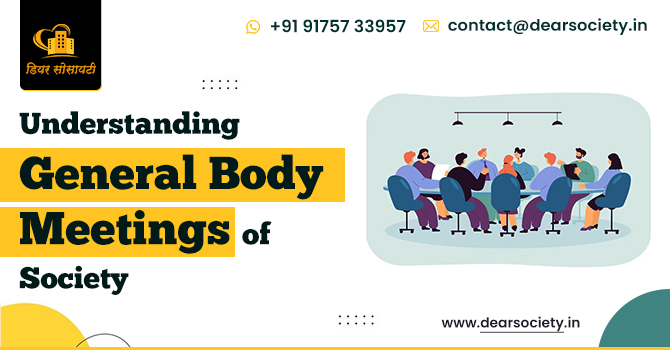Introduction
General Body Meetings (GBMs) are crucial events for housing societies and organizations, where important decisions are made, and issues are discussed. These meetings provide a platform for both individual members to voice their concerns and for the society to make collective decisions that affect all residents. Understanding the role of GBMs can help both individuals and societies navigate their rights and responsibilities effectively.
The Role of Individuals in General Body Meetings
As an individual member of a housing society, attending GBMs is your right and responsibility. It’s a chance to participate in discussions, vote on key issues, and express any grievances you might have. Active participation ensures that your voice is heard and that the decisions made reflect the interests of the community. Understanding the agenda, preparing your points, and knowing how to vote can make your participation more effective and impactful.
How Societies Use General Body Meetings to Seek Justice
For housing societies, GBMs are not just routine gatherings; they are essential for maintaining transparency and accountability. Societies use these meetings to address collective issues, such as resolving disputes, managing finances, and ensuring compliance with regulations. GBMs are also a forum for seeking justice, where grievances against builders, service providers, or even internal members are discussed and actions are decided upon. By using GBMs effectively, societies can uphold the rights of all members and ensure fair practices.
Key Elements of a Successful General Body Meeting
For both individuals and societies, the success of a GBM depends on thorough preparation and active participation. Agendas should be clear and circulated in advance to allow members to prepare. During the meeting, it is important to ensure that all voices are heard and that decisions are made transparently. Proper documentation of the discussions and resolutions passed is essential for future reference and legal compliance.
Conclusion: The Importance of Active Engagement in GBMs
General Body Meetings (GBMs) are pivotal in fostering a transparent and cooperative environment within housing societies. They represent a cornerstone of democratic governance within such communities, where every member has the opportunity to shape the collective future of their living environment. Active engagement in GBMs not only empowers individual members but also fortifies the overall health of the society itself.
For individual members, GBMs offer a direct channel to influence decisions that affect daily living. This involvement goes beyond merely attending meetings; it requires a proactive approach to understanding the issues at hand, preparing relevant questions or suggestions, and voting in a manner that reflects personal and collective interests. This level of engagement ensures that diverse perspectives are considered and helps in crafting well-rounded, inclusive policies. Furthermore, it fosters a sense of ownership and accountability among members, which can lead to greater satisfaction and cooperation within the community.
On the flip side, for housing societies, GBMs are an indispensable tool for effective governance and conflict resolution. They serve as a platform to address a spectrum of issues, from financial management and maintenance concerns to disputes among residents or with external parties such as builders or service providers. When societies use GBMs to seek justice, they uphold principles of fairness and transparency, reinforcing trust within the community. For instance, when a grievance against a contractor is raised, a GBM can be instrumental in discussing the issue openly, evaluating evidence, and reaching a consensus on appropriate actions. This approach ensures that decisions are made collectively and are more likely to be perceived as fair and legitimate.
Successful GBMs hinge on meticulous preparation and clear communication. Societies should strive to circulate agendas well in advance, providing members ample time to review and prepare. During the meeting, a structured format should be maintained to ensure that discussions remain focused and that all viewpoints are heard. The role of the presiding officer or committee in moderating the meeting effectively and ensuring adherence to procedural norms cannot be overstated. Additionally, accurate minutes should be recorded and disseminated promptly, capturing key discussions and resolutions, which is crucial for maintaining historical records and for reference in future meetings.
Moreover, fostering a culture of respect and constructive dialogue during GBMs can significantly enhance their effectiveness. Encouraging members to express their views respectfully and providing a platform for all to be heard contributes to a more harmonious environment. Societies can also benefit from periodic reviews of their meeting processes and structures, incorporating feedback to continually improve the effectiveness of their GBMs.
In summary, active engagement in General Body Meetings is vital for both individuals and societies. For members, it represents a chance to influence decisions and ensure that their voices are heard. For societies, it is a mechanism for maintaining transparency, resolving conflicts, and upholding fairness. By understanding the significance of GBMs and committing to their active participation, members and societies can work together to create a more equitable and harmonious living environment.
1. Website – https://www.dearsociety.in/
2. Instagram – https://instagram.com/dearsocietymh?igshid=NmE0MzVhZDY=
3. LinkedIn – https://www.linkedin.com/company/dear-societyin/
4. Facebook – https://www.facebook.com/dearsocietyMH?mibextid=ZbWKwL














 Call
Call Whatsapp
Whatsapp Enquiry
Enquiry